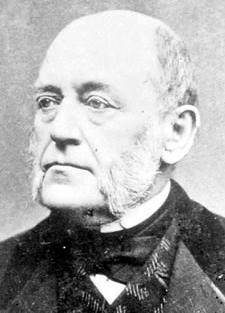Carl von Rokitansky (Carl von Rokitansky)

Carl von Rokitansky was born in Hradec Králové (German: Königgrätz), Bohemia. He studied at the Charles University in Prague (1821–1824) and attained a doctorate in medicine on 6 March 1828 at the University of Vienna. In 1830, he became assistant to Johann Wagner, the professor of pathological anatomy, and succeeded him in 1834 as prosector, being at the same time made extraordinary professor. He became a full professor ten years later. In 1847, to his duties as a teacher, Carl von Rokitansky added the onerous office of medico-legal anatomist to the city of Vienna. In 1863, Rokitansky was appointed by Anton von Schmerling as medical adviser to the Ministry of the Interior, wherein he advised on all routine matters of medical teaching, including patronage. As a young professor[when?], Rokitansky recognized that the still little noted discipline of pathological anatomy could be of great service to clinical work in the hospital, because it could offer new diagnostic and therapeutic possibilities to the bed-side physician. Ludwig Freiherr Baron von Türkheim (1777-1846) established the Second Vienna Medical School in 1836. Around Rokitansky’s autopsies the school began “one of the most fruitful and brilliant epochs of Viennese medicine”. A paradigm shift occurred, led by Rokitansky, Josef Škoda, and Ferdinand von Hebra, moving from the notion of medicine as a branch of natural philosophy, to the more modern notion of it as a science.
Although Carl von Rokitansky defended the “materialistic method” in scientific research, he rejected materialism as a philosophical world view. In his commemorative speech on the occasion of the opening of the Institute of Pathological Anatomy at the General Hospital of Vienna, he warned against the abuse of “natural science liberties”. Scientists should first regard humans as “conscious and free-willing subjects” and only then follow their urge toward knowledge. The feeling of humanity would be lost if physicians regarded human beings purely as research objects. Thus Rokitansky brought up for the first time the question of ethics in medicine. In another speech about the “solidarity of all animal life”, delivered at the Imperial Academy of Sciences, Rokitansky showed his proximity to Arthur Schopenhauer’s writings on compassion: “if we [… ] preserve and practice compassion”, he explained “we are able to alleviate part of the load of suffering” of patients. Human generosity will be shown by our capability to accept the greatest sufferings by voluntarily renouncing aggression. Those who succeed in this should be our greatest ethical role models. In 1845, he was elected a foreign member of the Royal Swedish Academy of Sciences. On 17 July 1848 Rokitansky was elected as an effective member of the Imperial Academy of Sciences. In 1866, he became its vice-president and from 1869 until his death in Vienna, Austria-Hungary, on 23 July 1878, its president. Carl von Rokitansky felt that this “was the largest honour which I could enjoy”.
Born
- February, 19, 1804
- Hradec Králové, Bohemia
Died
- July, 23, 1878
- Vienna, Austria-Hungary
Cemetery
- Hernalser Friedhof
- Vienna, Austria



